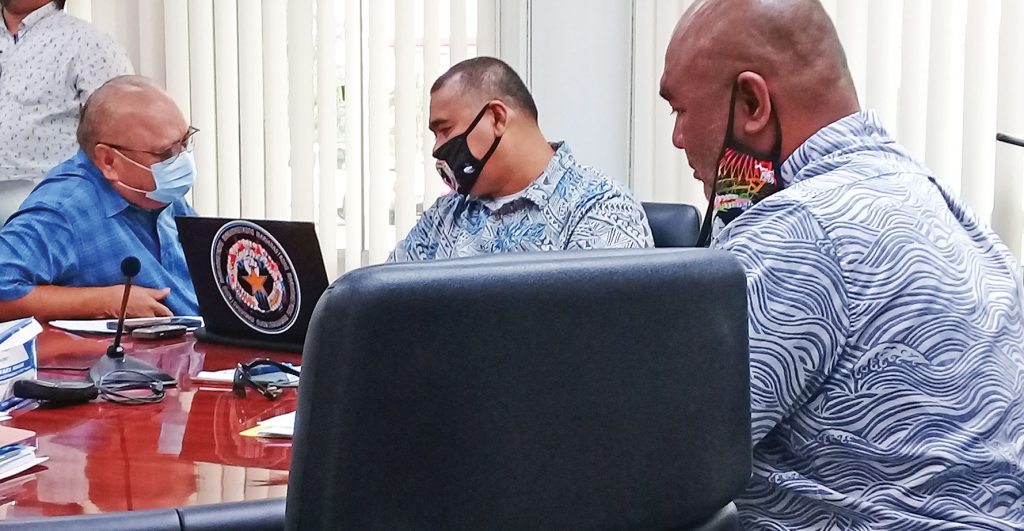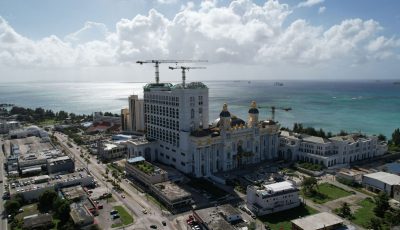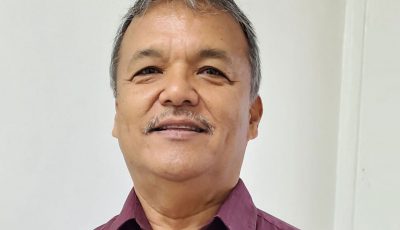‘Only CCC has the authority to suspend or revoke casino license’

Commonwealth Casino Commission chair Edward Deleon Guerrero confers with Commonwealth Lottery Commission member Finance Secretary David DLG Atalig during a recess at CLC’s meeting Thursday in the governor’s conference room. Also in the photo is CLC chair Mark O. Rabauliman. (FERDIE DE LA TORRE)
Commonwealth Casino Commission chair Edward Deleon Guerrero said that only the CCC board has the authority to revoke or suspend the casino license of Imperial Pacific International (CNMI) LLC.
At the Commonwealth Lottery Commission’s meeting in the Office of the Governor’s conference room Thursday, Deleon Guerrero said the annual license fee matter is presently the subject of CCC’s enforcement action.
IPI failed to pay this year’s $15.5 million license fee that was due last Aug. 12.
Deleon Guerrero pointed out that Public Law 19-24 clearly specifies that the annual license fee shall be paid on or before the first Oct. 1 of each year. “We are now Oct. 8. And to my knowledge none has been paid,” the chairman said during the public comment portion of the CLC meeting.
This is the license for IPI to have access and to operate its gaming machines, gaming tables, and license for some key employees. “There is a question now, obviously, they cannot operate it because they do not have the license now,” Deleon Guerrero said, adding that he is checking on their legal counsel on what to do as this may complicate issues.
At this time, the CCC has no further comment on the matter other than to note that the annual license fee is set by the Legislature, Deleon Guerrero said. Enforcement action means that the CCC executive director and the entire staff of CCC, inclusive of the enforcement investigations, have filed a complaint against IPI for major violations for noncompliance. Procedurally, Deleon Guerrero said, IPI is entitled to a hearing, and the CCC commissioners will be sitting as somewhat of an appellate review.
“So we have to remain impartial. And we have to hear what our staff have filed. We have to hear what IPI’s answers are,” he said.
Deleon Guerrero said they take this responsibility “very seriously” and want to make sure that they follow the procedures that’s currently in place to assure that whatever the step they take can withstand judicial scrutiny. “We have no intention of backing off on any of this responsibility,” he said.
With respect to IPI’s request to the Commonwealth Lottery Commission to keep its exclusive gaming license, Deleon Guerrero said the number of gaming license is controlled by legislation and the Legislature alone determines whether there will be one or more license. Presently, he said, IPI has exclusive license and that whether it gets to keep it is not up for the CLC to decide. Deleon Guerrero said the current license is subject to IPI’s compliance with the terms and conditions of the license agreement.
Pertaining to IPI’s proposal to postpone the payment of the $20 million community benefit fund that is due this month, Deleon Guerrero said this matter is also a subject of enforcement action before the CCC. He said the CCC has again no comment at this time other than to note that the community benefit fund is a creation of the casino license agreement.
The chairman also found PI’s position that, based on the CLA, the CCC only supervises gaming operations and not IPI’s hotel operations or construction, to be “very offensive” to CCC.
Deleon Guerrero emphasized that the CLC has no authority to amend CCC’s authority. He said the casino commissioners’ authority and jurisdictions are created by statute and that the casino license agreement cannot remove the authority that was specifically granted by the statute.
On IPI’s request that P.L. 20-85 be made retroactive to July 2015 so that IPI can sue patrons over unpaid debts starting from 2015, Deleon Guerrero said this law is about preventing fraudulent misuse of financial instruments in casino gaming and other transactions. He said CLC’s ability to grant this relief is still unclear even to CCC so they have no comment on this point at this time.
On IPI’s force majeure argument, Deleon Guerrero said the CLA force majeure provision provides for up to six months’ suspension of IPI’s obligation due to forces outside of its control, like acts of God, “whether it’s a Super Typhoon Yutu or COVID-19 pandemic.” Deleon Guerrero said IPI is requesting CLC to amend this provision to reduce future license fee proportionally. The chairman noted that this matter is presently the subject of a CCC enforcement action, so they have no comment at this time other than to say that the annual casino license fee is set by the Legislature. He gave a similar response when asked about IPI’s proposal to reduce the $3 million annual regulatory fee to $1.5 million, that this matter is also the subject of an enforcement action and that the fee is set by the Legislature.
On IPI’s proposal for the legalization of online gambling to offset the impacts of the various unfavorable changes in the economy and the disastrous impact of COVID-19 over the global economy, Deleon Guerrero said it is unclear to CCC how the CLC can grant such a relief. He said the CLC may want to consult with their legal counsel regarding the Federal Wire Act restrictions.
“If you have internet gaming within the CNMI, it defeats the purpose of having outside people play at the casino. The Wire Act, as I understand it, may not allow that to occur,” he added.
During Thursday’s meeting, CLC took out from its agenda several IPI proposals, but allowed IPI to defer for six months its payment of the $20-million community benefit fund due to force majeure.



























